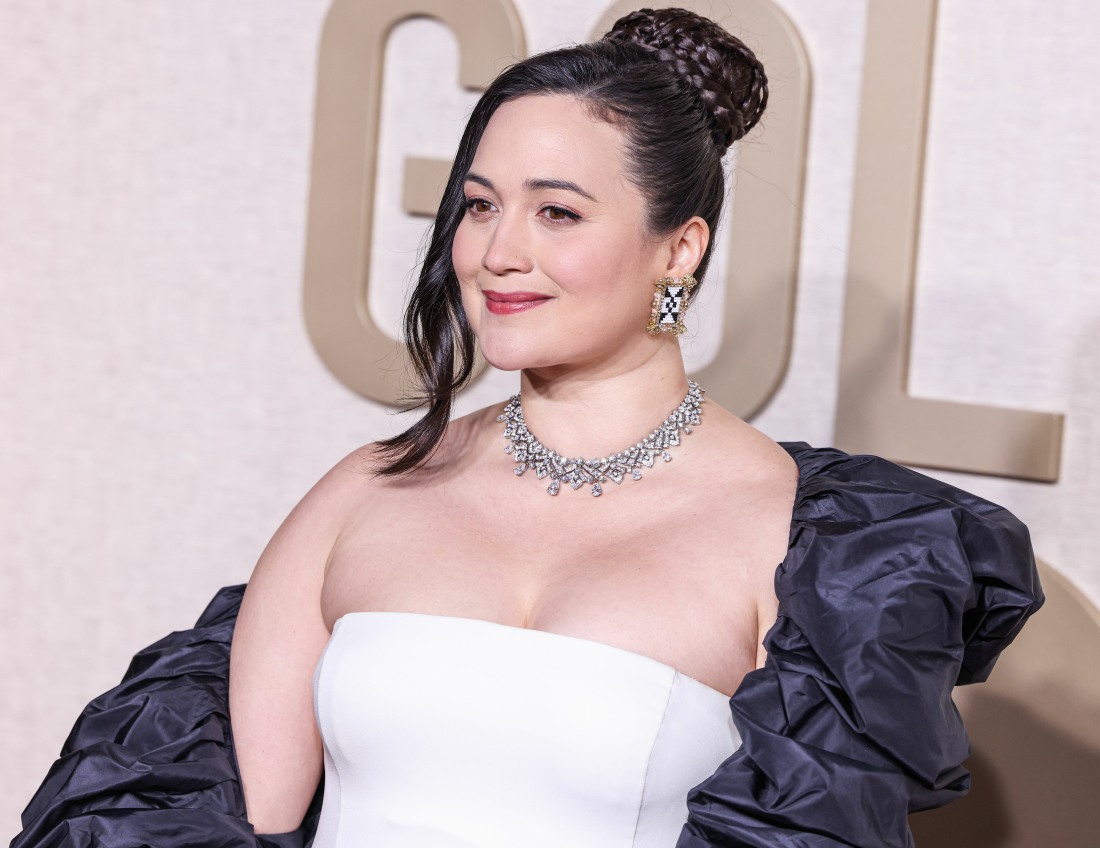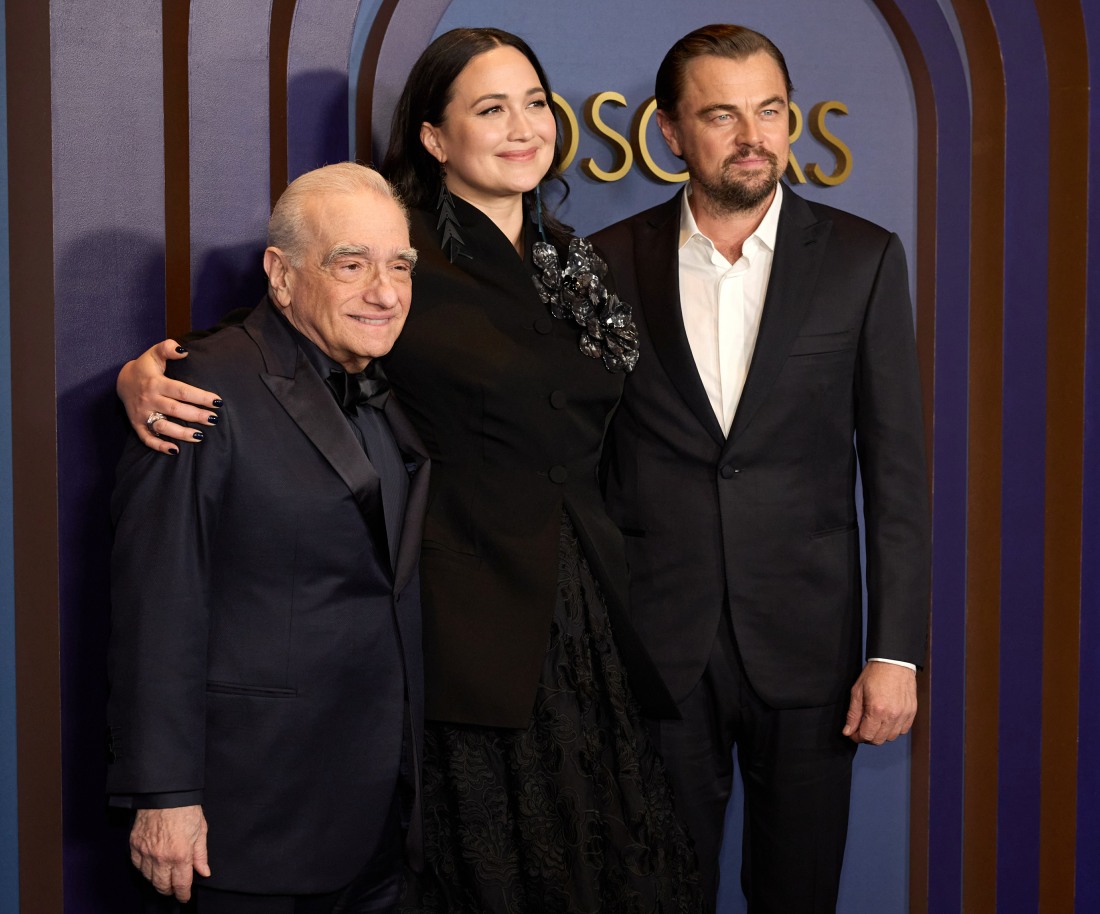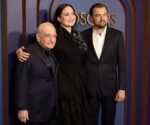When I was writing about Lily Gladstone’s Golden Globe win, I screwed up as I tried to explain why I have such mixed feelings about Lily’s Oscar campaign for Killers of the Flower Moon. Lily is good in the movie and she does a great job with the material. But I have real problems with KOTFM, and my anger towards the movie sort of spilled out onto Lily, because Lily is already picking up a lot of awards for the film. As I explained in our latest podcast, originally KOTFM was supposed to be more about the newly-formed FBI investigating the murders of the Osage people (mostly women). Then Martin Scorsese decided that he didn’t want to tell a white savior story, as in “all of these murders happened and then the FBI came in and saved the day.” But Scorsese’s solution to the “white savior” problem was to refocus the story on the murderers. Instead of an Osage-focused story, instead of centralizing Mollie Burkhart and the Osage families, the film is about the white men who systematically murdered the Osage for years.
All of which to say, I don’t think Lily Gladstone’s Mollie is even “the lead” in the film – it was more about Leo DiCaprio’s character and Robert DeNiro’s character. Lily isn’t the first actor to category hop, but it definitely feels like Lily’s Best Actress wins are papering over the larger problems with KOTFM and the problems with building the narrative in this particular way. Well, I’m not alone in feeling this way. Indigenous actor Devery Jacobs blasted KOTFM several months ago – Jacobs worked with Lily on Reservation Dogs, and here’s some of what Jacobs said about the film:
“Being Native, watching this movie was f–king hellfire. Imagine the worst atrocities committed against [your] ancestors, then having to sit [through] a movie explicitly filled with them, with the only respite being 30 minute long scenes of murderous white guys talking about/planning the killings. It must be noted that Lily Gladstone is an absolute legend and carried Mollie with tremendous grace. All the incredible Indigenous actors were the only redeeming factors of this film. Give Lily her g–damn Oscar. But while all of the performances were strong, if you look proportionally, each of the Osage characters felt painfully underwritten, while the white men were given way more courtesy and depth.”
“I don’t feel that these very real [Indigenous] people were shown honor or dignity in the horrific portrayal of their deaths. Contrarily, I believe that by showing more murdered Native women on screen, it normalizes the violence committed against us and further dehumanizes our people. This is the issue when non-Native directors are given the liberty to tell our stories; they center the white perspective and focus on Native people’s pain,” Jacobs wrote, while later adding: “I would prefer to see a $200 million movie from an Osage filmmaker telling this history, any day of the week. I’m sorry, but Scorsese choosing to end on a shot of Ilonshka dances and drumming? It doesn’t absolve the film from painting Native folks as helpless victims without agency.”
Yeah, I 100% agree with all of this. It’s especially egregious to think of the run-time – with nearly four f–king hours, you couldn’t even center Mollie’s story for an hour? Again, the film is still centered in whiteness – instead of a white savior, we have a four-hour meditation on the white murderers and how THEY feel about murdering the Osage. Well, in a recent profile, Lily was asked about Jacobs’ comments. Here’s Gladstone’s response:
“We’re friends. I crashed on her couch in Toronto when ‘Certain Women’ played at TIFF,” Gladstone said when asked about Jacobs’ criticisms, with Rolling Stone noting the actor’s “face drops” when the topic is brought up. “I don’t want to bring heat back on her for this because I think that’s unfair. Her reaction is hers.”
“Her reaction is a response to a lot of trauma that particularly Native women feel seeing these things for the first time,” Gladstone continued. “I had a lot of time acclimating myself to the script. The Osage people have had their lives to understand this history. The process of making this movie gave a lot of people a chance to speak. Ultimately, Osage reaction is what I care about the most.”
I think Gladstone’s response is fair – clearly, Jacobs is entitled to her opinion, and yet Gladstone is (rightly) proud of the film and her work in it. I also think it’s deeply unfair to put this on Gladstone in any way – she didn’t produce it, she didn’t write it, she didn’t direct it. While it’s fair to ask Lily about Jacobs’ criticisms, I’d like to hear Marty Scorsese and Leo’s reactions too. It felt like Marty rewrote the script specifically to “give” Leo a showy lead role, and from there, all of the Osage stories were marginalized.
Photos courtesy of Avalon Red.
- BEVERLY HILLS, LOS ANGELES, CALIFORNIA, USA – JANUARY 07: Lily Gladstone wearing Valentino arrives at the 81st Annual Golden Globe Awards held at The Beverly Hilton Hotel on January 7, 2024 in Beverly Hills, Los Angeles, California, United States.,Image: 835207952, License: Rights-managed, Restrictions: , Model Release: no, Pictured: Lily Gladstone, Credit line: Xavier Collin / Image Press Agency / Avalon
- BEVERLY HILLS, LOS ANGELES, CALIFORNIA, USA – JANUARY 07: Lily Gladstone wearing Valentino arrives at the 81st Annual Golden Globe Awards held at The Beverly Hilton Hotel on January 7, 2024 in Beverly Hills, Los Angeles, California, United States.,Image: 835208130, License: Rights-managed, Restrictions: , Model Release: no, Pictured: Lily Gladstone, Credit line: Xavier Collin / Image Press Agency / Avalon
- NEW YORK, NY – JANUARY 11: Lily Gladstone at the National Board of Review Annual Awards Gala 2024 at Cipriani 42nd Street on January 11, 2024 in New York City. Copyright: xRWx,Image: 836268255, License: Rights-managed, Restrictions: imago is entitled to issue a simple usage license at the time of provision. Personality and trademark rights as well as copyright laws regarding art-works shown must be observed. Commercial use at your own risk., Model Release: no, Credit line: IMAGO/RW / Avalon
- NEW YORK, NY- JANUARY 11: Lily Gladstone at NBC s Today Show on January 11, 2024 in New York City. Copyright: xRWx,Image: 836298620, License: Rights-managed, Restrictions: imago is entitled to issue a simple usage license at the time of provision. Personality and trademark rights as well as copyright laws regarding art-works shown must be observed. Commercial use at your own risk., Model Release: no, Credit line: IMAGO/RW / Avalon
- Lily Gladstone and Leonardo DiCaprio arrives at the 14th Governors Awards in the Ray Dolby Ballroom at Ovation Hollywood on Tuesday, January 9, 2024,Image: 836569687, License: Rights-managed, Restrictions: -, Model Release: no, Credit line: Trae Patton / @ A.M.P.A.S / Avalon
- Martin Scorsese, Lily Gladstone, and Leonardo Di Caprio arrive at the 14th Governors Awards in the Ray Dolby Ballroom at Ovation Hollywood on Tuesday, January 9, 2024,Image: 836569701, License: Rights-managed, Restrictions: -, Model Release: no, Credit line: Trae Patton / @ A.M.P.A.S / Avalon



















Thank you to Devery Jacobs and Lily Gladstone for showing how nuanced, complex, and respectful public discourse can happen.
Wyt men gonna always wyt man. I felt some sort of way just seeing the trailer for KOTFM and now that I’ve read this article, I know why too. I’ll never watch though, I’m sad enough without adding mad along with more sad.
Instead of watching it, I read the book, which is a non-fiction account of the formation of the FBI. It is not about the Osage and thus is also not about white saviorism. It’s about the FBI. A well researched film from the Osage perspective would have been fascinating. When KOTC dropped onApple+ I tried to watch it, but the cartoonish villians were too much. Is it so hard to trust viewers to finf these men monstrous without questionable added dramatic emphasis?
this is one of the reasons I haven’t watched it yet. I really enjoyed the book, because I thought it told two very interesting stories that I hadn’t heard before – the Osage murders, and the creation of the FBI.
But it seems the movie almost completely does away with the latter part, and then twists the former part to be about the men committing the murders?
Bettyrose – Thank you for your perspective! Had been planning to watch, but will probably skip it or just run it in the background. After having read historian Garrett Graff’s excellent “The Threat Matrix: The FBI at War in the Age of Global Terror” which dips into formation of the FBI, I’ll probably put KOTFM book at the end of reading list queue. Sounds like Scorsese tried to make the topic too broad.
One of the ironies of this whole situation is there was a lot of blather during the early promotion of the movie about how Scorcese decentered white people and focused on the stories of the Indigenous people and whoops…no they didn’t. The movie focuses on white people. It was a total bait-n-switch.
I gave up halfway through, so I can’t say whether the movie eventually centered on Indigenous people. But like I said above, the book didn’t. Yes, it covered the Osage murders, but it was always from a perspective of investigative journalism and never pretended to be a representation of Osage experience. It’s a very dry, matter of fact telling of the incidents, but I appreciated that because a white journalist shouldn’t be pretending to understanding the Osage experience. The murders are absolutely horrifying, and so was every attempt of U.S. government agencies to deny the Osage their wealth and autonomy. However, because the book is mostly about how the Osage murders triggered this new government agency, the FBI, it’s also not about the murderers. That’s what I disliked so much about the movie (the half I watched). The very fact of the murders is horrifying. We don’t need Lex Luther style evil characters to remind us that murder and racism are bad. Or, sadly, maybe we do. But it’s not high end filmmaking. An original script written by and for the Osage perspective would be something truly meaningful.
Oh yes, THIS. Every time Marty opens his snide mouth to criticize a Marvel movie, or superhero movies, or Barbie, all I hear is the sniveling of an over-privileged rich, white male who’s pissed that his legacy is being subsumed by other voices. Audiences want more now than yet another overwrought, strongwhitemale-driven drama, which is all he’s capable of. And he chooses to neglect the unique nuance of Marvel or Barbie in expressing new voices in an unconventional format. In Marty’s very small world, only men are worth paying attention to. Women and minorities are just foils.
As much as I liked The Departed, Marty can kindly go f—- himself.
This is such a profoundly bad take. Scorsese has done more to preserve world cinema, particularly by marginalized voices, and get it seen by a white, western audience than almost anyone in the film industry. Have you never heard of his World Cinema Project? Additionally, he has said numerous times that the Osage perspective was not his story to tell, and that he would be thrilled if a native director took up the challenge to tell the story from the native POV. Takes like yours are exactly the problem with an industry oversaturated with mindless drivel that refuses to challenge the viewer.
And takes like yours is why old white guys still pretty much run the world. Scorcese started all those projects for his own ego. Because look here you are doing it again. He keeps trying to make the world believe he’s this great artist. But he just keeps telling the same story over and over. With just different people and places. He’s not curing cancer. He’s making something to occupy people for a few hours. And now at his age he’s totally stuck. Never listening or learning from anyone else.
@Minimoose763
As a First Nations woman, I agree with @SquiddusMaximus here.
He can go fk himself. At least with KOTFM. indigenous voices are saying this movie was WRONG to make.
I don’t know, it sounds a bit disingenuous to me. Scorsese would be thrilled if the Osage told their own story – yet, with his name he sucks up all the oxygen with an almost 4-hour movie. Tell me an Osage filmmaker would get attention, time and money out of Hollywood.
“An Osage director should tell the Osage story” is rich coming from Scorcese. He knows damn well that once he tells the story Hollywood considers it told and no unknown Osage director is going to get a budget of hundreds of millions to retell it. I agree that he refocused the narrative on Dicaprio’s character as Oscar bait which is why it’s so fitting he’s being snubbed.
I don’t think Martin Scorsese had actually criticized Barbie has he? I know he has said that Marvel movies are like, artless but Margot Robbie produced Barbie and was in Wolf of Wall Street and it was shot by a cinematographer that he works with. I believe he said that movies like Barbie (and Oppenheimer) gave moviegoers another option in cinema, rather than all of the Marvels. Not to lose the plot here, and there’s a lot to criticize but he stood up for Barbie
Oliver Stone did but walked it back. I haven’t heard anything from Scorcese about Barbie.
It shows no stop murder because it was non stop murder. It was essentially systematic domestic violence against women to get the mineral rights. That’s how they secured the inheritance. I don’t know how else you would be able to tell the story.
As for women not having agency in the story. They didn’t. It was an unmitigated bloodbath from those closest to them.
She played her character how the families said these women mannerisms as well as their behavior. They said she nailed it.
Scorsese knows there won’t be more than one big “native” film in a year, or in an awards season – if he can’t tell the story of the Osage and not just their murderers, then he shouldn’t be involved here. Use your platform to uplift other artists, if it’s important to you.
But then he wouldn’t get his ego stroked. About how brillant he is. Or how much of an artist. He needs to realize that his time has come and gone. And it’s not coming back. And he can’t seem to move on and learn about what is going on today.
If anyone thinks Scorsese and Leo are doing “good” here with this movie they need to read up on white saviour history and just white man and Indigenous history in general.
This story was VERY comfortable for the white men to tell because it CENTERED AROUND THEM. The constant narrative about Leo “supporting” and “elevating” Lily Gladstone like she needs it anyway is so demeaning and perpetuates the same old narrative that Hollywood LOVES.
Yes we will tell black/indigenous/POC stories but in OUR way. For Black communities (of which I am part) it is as long as we continue to focus on slavery, impoverishment, drugs, gangs, and ghettos. For Indigenous groups it is as a side story to our narrative and skirting around the MASSIVE devastation they have and continue to ensure on stolen land.
I havent seen it for just this fear, that is an almost-4-hour white savior fest.
The only “benefit” (and I use that term generously here) I can see of this white-centering is that if we are in the room with the white people, we could potentially plainly see the cold blooded, evil calculation of it all.
Can someone who has seen it let me know if that comes across at all? Or is this just white savior and nothing more?
Slush, from my white perspective it shows the vile, greedy, murderous duplicity of the ways white settlers have acted (still do) towards Native peoples in all its sickening, incredible reality. It’s hard to watch but I’m glad I did. The Osage influence is wonderful, imo, and provides sharp contrast to the brutality of the whites. I’ve never seen anything like that in an old-school movie. Also, early on, Mollie’s character is established as powerful, complex and about 80x smarter than her white man (DiCaprio), and the story shows her surviving unimaginable assaults to her life, family and who she is, again a nightmare to watch, but very real. The white FBI agent couldn’t have succeeded without the Native agent, very clear in film. I think white saviorism is avoided, unless the entire film is perceived as such (not my perspective but I honor any criticism of the film).
Reservation Dogs is worth more than any watch that KOTFM is offering . Lily Gladstone’s single scene is extremely touching. She speaks with such quiet intensity, her character invokes the female ancestors explicitly and powerfully, I got chills watching it. Give her an Oscar, she’s so f’ing fantastic. I want her to have every opportunity to shine.
Reservation Dogs is such a good show! All 3 seasons is so well done, I’ve watched and re watched it so many times, and cried each time. I’m so sad it’s over.
I’d like to see Tommy Orange’s There There adapted to tell an authentic story about the modern day Native experience in America, but maybe it would be better served as a multi-part series than a movie, given streaming is where complex stories find their home now. There’s plenty of suffering in the book, but it’s not a book about suffering, and it would be very hard to twist it into a tale of white saviorism.
Of course Scorsese centered the murderers and patted himself on the back for not making it about the fbi. He doesn’t have the range to do anything else.
I Will say I’ve followed various Osage nation accounts on Facebook, since before this movie was a thing, and they’re excited about the project. The Osage nation was involved heavily in the filming, and there’s lots of artists involved who are getting wider exposure. I visited the towns this was filmed in, in 2019, and one of them was basically abandoned. Like, drunks staggering in the middle of Main Street on Sunday morning with no traffic abandoned (Fairfax). Using it as the film set did revive the area somewhat.
Lily shouldn’t have to answer for the focus of the movie, that’s on Scorsese, fully. I hope that with the success of Reservation Dogs and this, more film makers are able to tell their own stories from their perspectives, not filtered through an old white man. And Leo can eff off.